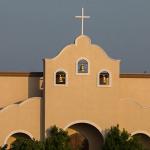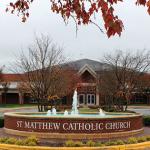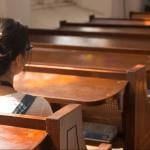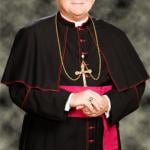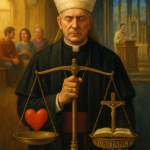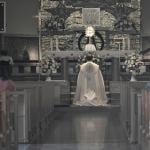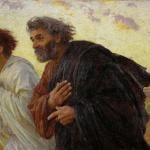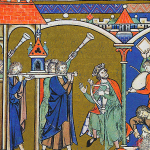Detroit has a large Muslim immigrant population, so it is significant that the Archbishop of Detroit, Allen H. Vigneron, issued the following statement two days ago:
In light of a public proposal put forth recently to restrict the immigration of Muslims into the United States based on their religion, I thought it would be helpful to remind everyone of the Catholic teaching regarding Islam. Fifty years ago, the Fathers of the Second Vatican Council taught that the Catholic Church treats with respect those who practice the religion of Islam. And for these past fifty years, Catholics and Muslims in southeastern Michigan have enjoyed warm relations marked by a spirit of mutual respect and esteem. While the Catholic Church refrains from weighing in for or against individual candidates for a particular political office, the Church does and should speak to the morality of this important and far-reaching issue of religious liberty. Especially as our political discourse addresses the very real concerns about the security of our country, our families, and our values, we need to remember that religious rights are a cornerstone of these values. Restricting or sacrificing these religious rights and liberties out of fear – instead of defending them and protecting them in the name of mutual respect and justice – is a rationalization which fractures the very foundation of morality on which we stand. This also threatens the foundation of religious liberty that makes it possible for us to freely practice our faith. These are not only Catholic sentiments on these issues; these, I believe, are the sentiments of all Americans.
The archbishop’s reference to Nostra Aetate is notable—and it’s been on the minds of many churchmen recently.
My colleague at CNEWA, Rev. Elias Mallon, wrote about it Friday, noting a recent statement by Orthodox rabbis, and concluded:
Arriving at the present level of trust and understanding — while recognizing there are still many areas which need further reflection — is a monument to the vitality and faithfulness of both Judaism and Christianity. The Orthodox rabbis were able to overcome incredible historical, intellectual and theological obstacles to arrive at this point and at the same time to be faithful to their history and tradition.
Their statement is one of great courage and hope for the future. The Catholic Church for its part continues to refine, purify and, where necessary, correct attitudes that were theologically deficient and all too often destructive.
In a world racked by religiously inspired violence, the example of the Catholic-Jewish dialogue provides hope and perhaps even a paradigm for the overcoming of deep differences and painful histories even after 2000 years.
And Deacon Bill Ditewig turned his attention to it a couple days ago, as well, focusing in particular on what the document had to say about Islam and other religions:
The statement that “the Catholic Church rejects nothing of what is true and holy” could sound rather obvious to some readers today, but for those bishops, this was a realization formed out of the real agonies endured by so many within their own lifetimes. They came to recognize that truth and holiness are not the province of any one church or faith, or form of government or economic system, and that it is only in recognizing this fundamental truth that healing and peace may be found. In a world still reeling from successive wars and atrocities, the bishops found a greater appreciation of our shared scriptures, especially St. Paul’s famous insight that “God does not take back the gifts he bestowed or the choice he made” (NA 4; Rom 11:28-29).
Nearly all of the bishops who promulgated the document have now passed into eternal life, but we remain. They brought their own life experiences, and the experiences of their people, into the Council aula, with the hope of transforming the world into a place where all could live in peace and justice. That mission has not changed for us. We too must bring our own experiences to bear on the life of the world that still suffers from poverty, war, discrimination, injustice, violence and death. In what ways, concretely, can we search together for Truth and Holiness? In what ways, concretely, can we work together – as sisters and brothers in a shared heritage – to end all hatred and persecution? Just as the bishops then together hammered out a document, a mission, to lay before the world, we “in our own time” (NOSTRA AETATE) must do the same — not only with Islam as a religion but even those fringe elements who hate us and would destroy us.
St. Pope John XXIII is said to have remarked about Communism: “Communism is the enemy of the Church, but the Church has no enemies.” That insight — that the Church has no enemies — can enlighten us no less today, especially during this Extraordinary Jubilee of Mercy.
Finally, it’s also worth bearing in mind what the catechism teaches about religious discrimination:
1933 This same duty extends to those who think or act differently from us. The teaching of Christ goes so far as to require the forgiveness of offenses. He extends the commandment of love, which is that of the New Law, to all enemies. Liberation in the spirit of the Gospel is incompatible with hatred of one’s enemy as a person, but not with hatred of the evil that he does as an enemy.
1934 Created in the image of the one God and equally endowed with rational souls, all men have the same nature and the same origin. Redeemed by the sacrifice of Christ, all are called to participate in the same divine beatitude: all therefore enjoy an equal dignity.
The equality of men rests essentially on their dignity as persons and the rights that flow from it:
- Every form of social or cultural discrimination in fundamental personal rights on the grounds of sex, race, color, social conditions, language, or religion must be curbed and eradicated as incompatible with God’s design.

